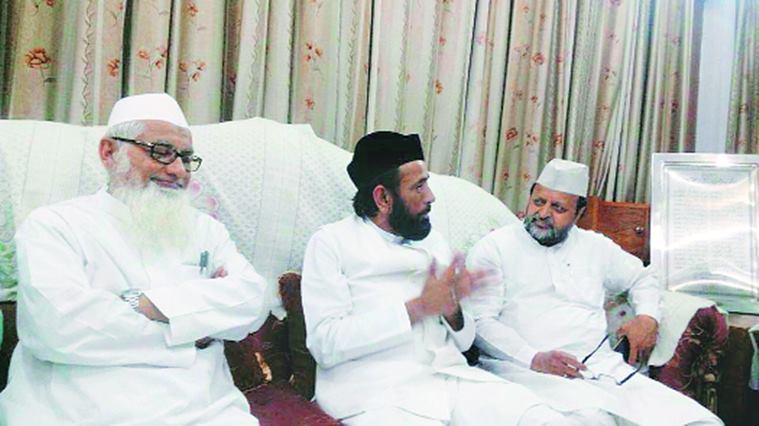9 Easy Facts About Barelvi Explained
Wiki Article
The 10-Minute Rule for Barelvi
Table of ContentsSome Known Questions About Barelvi.The Basic Principles Of Barelvi The Best Strategy To Use For BarelviSome Known Factual Statements About Barelvi
Radical Islamist groups in South Asia such as the Taliban are usually classified as Wahhabis, belonging to the ascetic, puritanical form of Islam institutionalised in Saudi Arabia. Yet while the ties between the Wahhabis and also the Taliban are tight, the last really belong to a different branch of the faith.Sunni Islam is separated into four orthodox colleges of legislation (Madhhabs), each of which is complied with in distinct components of the Muslim world. A variety of ceremonies and also prayer forms also differ among the colleges. As the map above suggests, Wahhabism, based in Saudi Arabia, is related to Hanbali legislation, the most strict type of Islamic law.
" Sunni Muslims," Haqqani writes, have cast apart their hostility to Wahhabi groups, developing a a great deal of conventional Sunnis that accept Wahhabi political and also jihadi ideas without necessarily quiting their ceremonies and also routines." As is usually noted, Saudi Arabian spiritual funding has helped damage down the barriers between the two sects.
The Facts About Barelvi Uncovered
Mapping the 4 conventional schools of Sunni Islamic law is reasonably very easy, although the authors of the Wikipdia map uploaded over should have commendation for doing a specifically great work. However the differences that really issue are not those of Madhhab, but rather are located among less official as well as a lot more recent "activities" within Islamic idea as well as practice.The Deobandi motion is straightened with Wahhabism and breakthroughs a just as extreme, puritanical analysis of Islam. The Barelvi activity, on the other hand, safeguards an extra conventional South Eastern variation of the belief centered on the techniques of Sufi necromancy. In India as well as particularly Pakistan, tensions in between the two teams can be extreme, occasionally bordering on open war.
As recently reported in the, "When the Taliban took control of Buner in April 2009, they initially besieged Pir Baba's shrine. Taliban leader Fateh Khan said it was since the area was a hub of 'adultery and idolatry.'" Consequently, many Sufi shrines are now heavily guarded by Pakistani security pressures.
One can, nonetheless, easily show their place of beginning, as both motions are called for towns in north India: Deoband as well as Bareilli. Radical Deobandi teams are most internet carefully associated with Pakistan and Afghanistan, the activity's intellectual and spiritual heart is still the Indian city of Deoband. Its Darul Uloom Deoband is deemed to be the second largest madrasah (religious institution) in the Sunni Muslim globe, complying with only Al-Ahzar in Cairo.
Some Known Details About Barelvi
Solid numbers are difficult to discover, a lot of specialists keep that Barelvis considerably out-number Deobandis not simply amongst Indian Muslims but in Pakistan., "some 15 per cent of Pakistan's Sunni Muslims would certainly consider themselves Deobandi, as well as some 60 per cent are in the Barelvi tradition.Early Deobandi leaders were troubled by the triumph of British manifest destiny and English-language education and learning, which they sought to combat by detoxifying their faith, stripping away mystical methods as well as other technologies that they saw as contrary to the belief (Barelvi). One of the why not check here most hardline Deobandis pertained to relate to Barelvis, as well as Shiites, as non-Muslim opponents deserving of strike.
Deobandi thinking is also standard to be nationalistic, relating to the community of the faithful, not the modern-day nation-state, as the appropriate Quranic political lorry. A lot of Deobandi scholars denied the partition of British India in 1947, choosing to look for the spread of Islam in a concentrated India. The idea of Pakistan, furthermore, was originally accepted by Muslim groups despised by the hardline Deobandis (Barelvi).
Over time, however, orthodox Sunni Islam came to dominate Pakistan. President Muhammad Zia-ul-Haq (1978-1988) worked difficult to turn Pakistan into a fundamentalist Sunni state, formally declaring the heterodox Ahmadis to be non-Muslims. As a result, the Pakistani government significantly diverted towards the rough Deobandi activity. The connection, nonetheless, is a two-edged sword for modern Pakistan, as the Deobandi faithful inevitably have contempt for nationwide identifications and also borders.
The Ultimate Guide To Barelvi
Doubters link it to terrorist organizations; the Taliban, after all, got up of Deobandi madrasahs in northeastern Pakistan, as did a number of other violence-prone organizations. Shocking fatwas (religious rulings) do his comment is here not aid its reputation. In May 2010, a decree that females can not function for salaries stunned mainstream Muslim point of view worldwide. (The described it as a "Talibanesque fatwa that stank of tribal patriarchy.") Much more unpleasant was the 2006 "fatwas for cash money" bribery scandal, which was revealed by an Indian tv sting procedure.

As Abedin writes: On the question of so-called Wahabism I place it to Madrassi that several movie critics of the Deoband seminary case that Deobandi ideas are just a little action away from major Wahabism. In response the deputy Vice Chancellor makes a clear separation between both institutions of thought, before adding that if we consider the Wahabis and also the Barelvis as 2 extremes, the Deobandis inhabit the centre ground in that continuum.
Report this wiki page